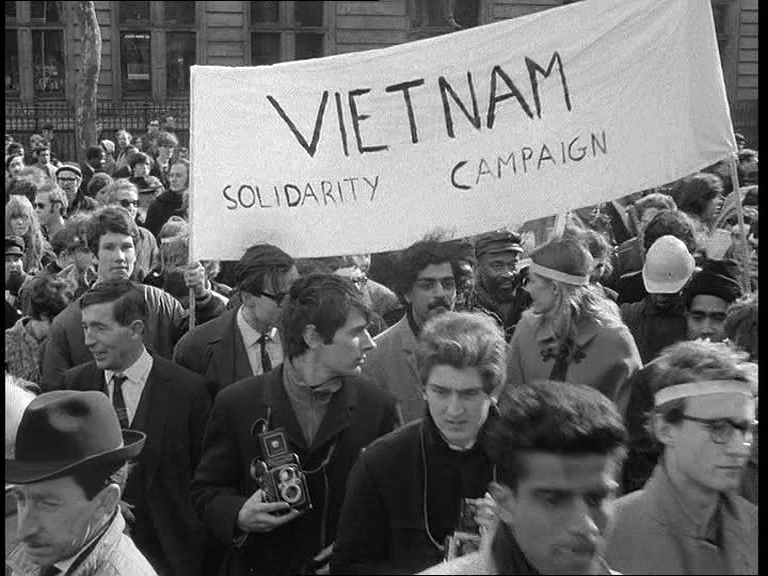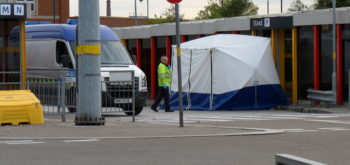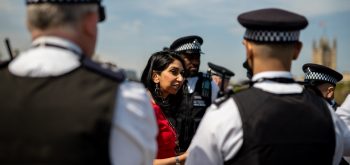Maintaining the security of the state is one of the axiomatic responsibilities of the government. For Thomas Hobbes, writing amid the upheaval of the 17th century, it was peoples’ search for security that led them to establish a government in the first place. Before this, people were wandering in what he called the ‘state of nature’, living in ‘continuall feare, and danger of violent death’. Such fears could only be set aside if they accepted a public authority who was given responsibility from protecting them from lives that were ‘solitary, poore, nasty, brutish, and short’.
Once established, however, the state takes on a mind of its own. It becomes concerned not only with protecting its citizens, but with protecting itself. To its citizens, the greatest and most obvious threat might come from outside its borders. Fears of marauding barbarians at the gates are primeval. But to the state, the more insidious and deadly threat comes from dissident citizens within. To combat this threat, governments created spymasters, who have played a vital role behind the scenes of the modern nation state from its very beginnings. Elizabeth I’s grasp on the English crown was tightened by Francis Walsingham’s machinations and deceptions, while John Thurloe rooted out the Royalist remnant in Britain and across Europe during Oliver Cromwell’s Protectorate. Now we have a raft of acronymed security services with neatly and not-so-neatly delineated responsibilities, all oriented towards a single objective – keeping the state safe.
Each of these institutions, from GCHQ to the SIS, practises to deceive. But few deceive on a more fundamentally human level than those operatives who take on a false identity and assume a false life, going undercover to identify, examine, and – if necessary – eliminate threats from within. Undercover operatives take advantage of humanity’s instinct to trust, cultivating relationships with people on the pretence of shared values and a shared ideology. If this is done well, the would-be revolutionaries are turtled, left vulnerable to the blade of the security services. Threats can be swiftly removed from the board, while operatives can sidle away from groups found to be harmless, with no one the wiser.
Doubtless this is how the Metropolitan Police’s Special Demonstration Squad (SDS) viewed its role when it was established in 1968. Set up by Special Branch to assess and defuse the threat posed by groups protesting the Vietnam War, its web of intrigue grew, ensnaring dissident groups. With few in government even aware of its existence, it operated semi-autonomously within the Metropolitan Police after senior officers decided that the threat posed by the extreme left justified their long-term penetration by undercover operatives. Over the coming decades, almost every major left-wing group was infiltrated, despite the fact that none of them ever posed a meaningful threat to the security of the state.
This is one of the key conclusions in the Undercover Policing Inquiry’s report on its first ‘tranche’, which examined the activities of the SDS from 1968-82 and was published last week. Announced by Theresa May, then Home Secretary, in 2015, the inquiry was tasked with examining the operation of the SDS (whose existence only came to light in 2010 when an undercover officer’s cover was blown). The anxieties of the British security establishment, worried about the threat to the democratic order, meant they wanted to have the ‘best information possible about revolutionary and subversive organisations in our midst’. What they were less anxious about was the conduct of their officers, and if the danger posed by the left warranted such stringent surveillance. As Conrad Dixon, the Detective Chief Inspector responsible for the initial SDS operation, noted, the ‘incompetence of the British left is notorious’.
For anyone who had hoped that it was the artifices of the British security state that stopped a red-hued revolution sweeping across the United Kingdom in the 20th century, the report makes for dismal reading. Trawling through it shows the vast majority of the radical left – then as now – to be hapless and naive ideologues, albeit pleasant ones. Various branches of the Vietnam Solidarity Campaign – which was initially established and funded by the philosopher Bertrand Russell – were infiltrated, only for the undercover officers to find that while ‘notionally revolutionary, none of them was capable of achieving revolutionary aims by force’.
Another officer reported on a ‘small and largely inactive anarchist group’ in London’s East End before moving on to joining the Tri-continental Committee, which had ‘few members’ but was still ‘riven with internal dissent’. The report’s discussion of how time was spent deciding to change the committee’s name to the British Tri-continental Organisation brings to mind the People’s Front of Judea sketch from Monty Python’s Life of Brian. Members were too busy squabbling about whether they were the PFJ or the JPF, or accusing each other of being ‘agents for foreign powers’ to get around to the actual business of fomenting revolution.
Over the course of the SDS’s operations, the fact that ‘none of the undercover officers… received any training… beyond reading the reports of deployed officers and speaking to them’ becomes self-evident. Left more often than not to their own devices, many of the operatives went beyond Dixon’s original directives. They took up positions of responsibility, chaired meetings, and initiated activity. One officer was noted for being a ‘willing and enthusiastic secretary’, even if his fellow members thought he lacked understanding of the ‘political views he claimed to espouse’.
More maliciously, some officers used identities of deceased children, a technique of unknown origin that led to at least one officer being exposed. Having infiltrated the ‘Big Flame Ireland Commission’, a ‘relatively undogmatic socialist group’, he was confronted by members over his identity as ‘Rick Gibson’. He made his escape by telling them he was on the run from the police, but it was the reason behind his unmasking that makes it particularly noteworthy. This officer had pursued a romantic relationship under the guise of his cover identity, as had other officers.
Some of this infiltration, as the report acknowledges, had value, but the negligible gains did not ‘begin to justify the infiltration of groups which posed no such threat’. According to the SDS’s own precepts, two key elements were required for a group to warrant infiltration. The first was that they pursued ‘activities which threaten the safety or well-being of the state’ and the second, that they intended ‘to overthrow parliamentary democracy by political, industrial or violent means’. Few, if any of the groups infiltrated ever had anything more than ‘[minimal] potential for inciting or participating in public disorder’.
Defenders of the operations of the SDS would no doubt sympathise with the Commissioner of the Metropolitan Police for some of the period under scrutiny, Sir Robert Mark. In his biography, he observed that ‘the simple truth is that fascists, communists, Troskyites, anarchists et al are committed to the overthrow of democracy and to the principle that the end justifies the means. Democracy must therefore protect itself by keeping a careful eye upon them’. Under this philosophy, while the conduct of some of the officers, like those who engaged in sexual relationships by deceit, was reprehensible, the driving motivation was not.
Sir Robert’s statement fundamentally misunderstands what it means to be a democracy. The moment that the state is intruding into the private affairs of its citizens – even if those private affairs are concerned with establishing a new political order – it ceases to be a democracy and crosses into a surveillance state. Integral to the idea of a democratic order is that the democratic order is kept in place by popular will, not by force or by threat of force. A democratic state has a legitimate interest in maintaining the security of the state and the safety of its citizens, but this does not extent to interfering in attempts from would-be revolutionaries to change the status quo through peaceful means. Almost every instance documented in the inquiry’s report is concerned with the latter, not the former. While it may be a cliche, the nature of the report is Orwellian, with the reports from the undercover officers containing ‘extensive details about individuals- their political views, personality, working life, relationships with others, and family and private life’.
State conduct like this unravels the fabric that binds together civil society. It makes people fearful and suspicious. A democratic society where people first view others with a sceptical eye, and are on alert for interlopers and traitors is not a society. It is more like living in an Hobbesian state of nature, but one overseen by an armed force keeping the worst of the violence at bay. In order for democratic society to function and to persist, the reality of freedom of speech and freedom of thought is that some clandestine operations will always be necessary. But state intrusions into the most intimate parts of citizens’ lives cannot be justified by a ‘better safe than sorry’.







